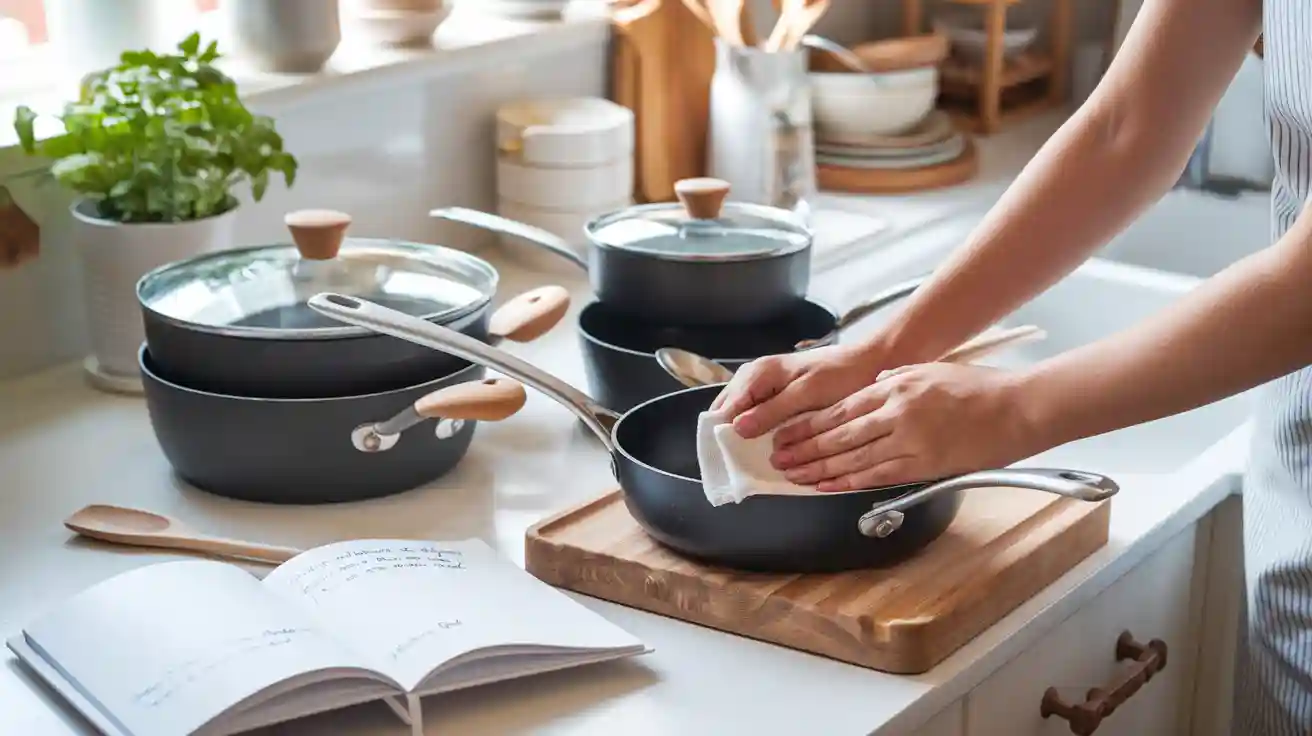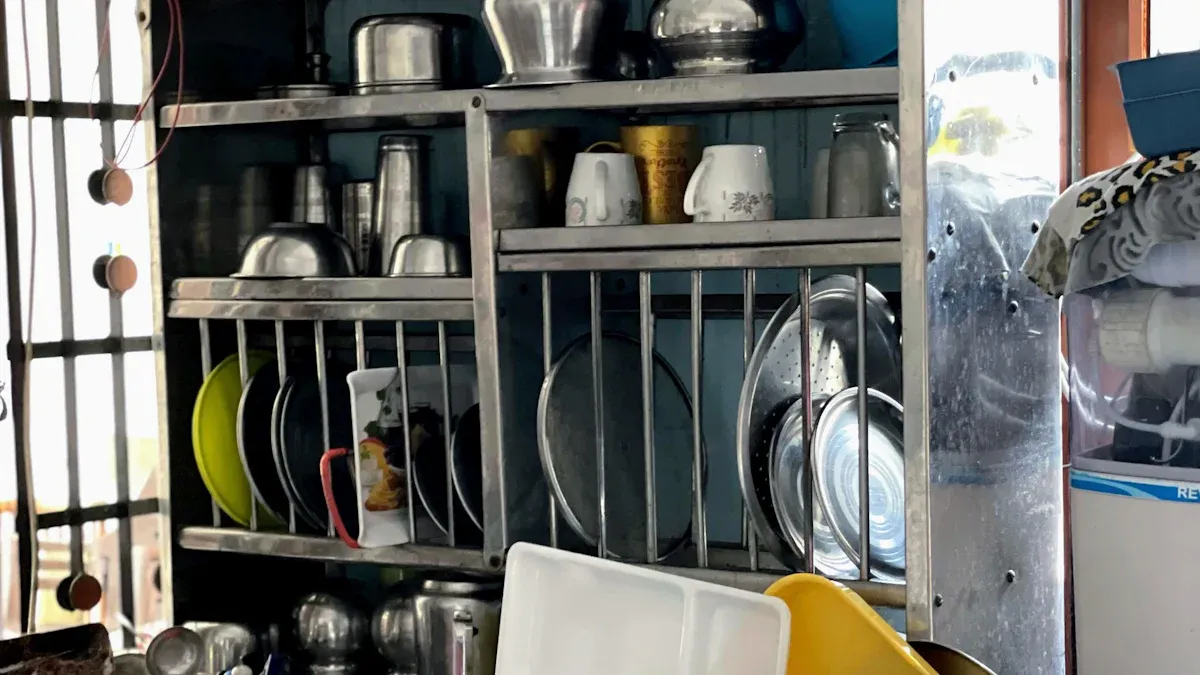
You want your cookware set to last for years, right? Start with proper care and cleaning. Handle your premium cookware gently and avoid harsh conditions. Choose quality pieces and follow simple tips. These habits help make your cookware last longer and keep every meal tasting great.
Choosing the Right Cookware Set for Each Task
Match Premium Cookware to Cooking Methods
You want to get the most out of your cookware set, so always use the right cookware for the right job. Each piece in your kitchen has a special purpose. Here’s a quick guide to help you choose quality cookware for every cooking task:
- Frying pans work best for frying, searing, and making omelets. Stainless steel pans handle high heat, while nonstick pans are perfect for eggs and pancakes.
- Saucepans are great for boiling pasta, making soups, or reheating leftovers. Stainless steel saucepans keep heat steady and don’t react with acidic foods.
- Stockpots help you cook big batches of soup or stew. Look for sturdy handles and a tight lid for even cooking.
- Cast iron holds heat well, making it perfect for slow-cooked meals. Aluminum and copper pans heat up fast and cook food evenly.
- Dutch ovens are your go-to for baking bread or slow-cooking meats.
Tip: Always use the right cookware for the right job. This keeps your high-quality cookware in top shape and helps your meals turn out better.
Avoid Common Misuses That Shorten Lifespan
Even the best cookware set can wear out fast if you use it the wrong way. Watch out for these common mistakes:
- Cooking on high heat all the time can warp pans and burn food.
- Using metal utensils scratches nonstick or stainless steel surfaces.
- Cleaning with steel wool or harsh cleaners ruins the finish.
- Not drying your pans after washing can cause stains or rust.
- Ignoring the manufacturer’s instructions may lead to damage.
Choose quality cookware and treat it with care. Your premium cookware will last longer and perform better.
Cleaning and Maintenance for Premium Cookware
Taking care of your cookware set is the best way to make it last. You want every meal to taste great, and you want your pans to look shiny and new. Let’s break down the best ways to keep each type of cookware in top shape.
Stainless Steel Cookware Care
Stainless steel pans look beautiful and cook evenly, but they need proper care to stay that way. If you follow these steps, you’ll keep your pans looking and working like new:
- Let your pan cool before washing. Never put a hot pan in cold water. This helps prevent warping.
- Wash with warm water, mild dish soap, and a soft sponge. For tough spots, use a nylon scouring pad.
- Dry your pan right away to stop water spots from forming.
- For stuck-on food, soak the pan in hot water for 15 minutes. This loosens the residue without harsh scrubbing.
- Got burnt food or stains? Make a paste with baking soda and water. Let it sit for 5-10 minutes, then gently scrub with a non-abrasive sponge.
- Use special stainless steel cleaners to restore shine and remove mineral deposits. Apply with a damp cloth in circles.
- Avoid metal scouring pads, steel wool, bleach, oven sprays, and ammonia. These can scratch or damage the finish.
- Match the pan size to the burner and preheat slowly. This helps prevent warping.
- Use wooden or silicone utensils to avoid scratching the surface.
- When stacking, place pot protectors between pans to keep them scratch-free.
Note: If you skip proper cleaning practices, you might see food sticking, stains, or even rust. Over time, harsh chemicals and rough tools can ruin the protective layer, causing corrosion and pitting. Always use non-abrasive cleaning tools and dry your pans well to keep them looking their best.
Nonstick Cookware Set Maintenance
Nonstick pans make cooking and cleanup easy, but you need to treat them gently. Here’s how you can keep your nonstick cookware working smoothly:
- Always use wooden, silicone, or plastic utensils. Metal tools can scratch and ruin the coating.
- Cook on low or medium heat. High heat can damage the nonstick surface.
- Hand wash with mild soap and a soft sponge. Skip the dishwasher and avoid abrasive scrubbing.
- Don’t use aerosol sprays. They leave sticky residue. Instead, use a small amount of oil or butter.
- Stack pans with protectors or soft cloths between them to prevent scratches.
- Every so often, season your pan by rubbing on a thin layer of oil and heating it gently.
- Never cut food in the pan. This can pierce the coating.
If you notice food sticking, peeling, or deep scratches, it’s time to replace the pan. Most nonstick pans last 2 to 3 years, but with proper care, you can stretch that to 5 years or more. Remember, once the coating starts to peel or rust appears, it’s safer to get a new one.
Cast Iron and Carbon Steel Upkeep
Cast iron care takes a little extra effort, but it pays off with a pan that lasts for generations. You want to keep your cast iron or carbon steel pan seasoned and rust-free. Here’s how:
- Clean the pan right after cooking. Use warm water and a little mild soap if needed.
- Dry the pan completely. You can use a towel or set it on low heat for a few minutes.
- Rub a thin layer of oil (like flaxseed or vegetable oil) over the whole pan, inside and out.
- Wipe off any extra oil so the pan looks dry, not greasy.
- Place the pan upside down in a cold oven. Preheat to 450°F and bake for one hour. Let it cool inside the oven.
- Repeat the oiling and baking process several times for a strong seasoning layer.
Tip: Regular seasoning builds a natural nonstick surface and protects against rust. After each use, a light coat of oil keeps the seasoning strong. Avoid soaking your pan or leaving it wet, and store it in a dry place.
Cooking with oil and avoiding acidic foods until your seasoning is well established will help your pan last. If you see sticky spots, it means you used too much oil or didn’t bake long enough. Just re-bake to fix it.
Caring for Copper and Specialty Cookware
Copper pans look stunning and heat up fast, but they need gentle handling. Here’s how you can keep your copper and specialty cookware looking and working great:
- Wash by hand with mild soap and warm water right after use.
- Dry immediately with a soft cloth to prevent water spots and tarnish.
- Polish regularly with a copper cleaner or a mix of salt and vinegar to keep the shine.
- Use only soft sponges or cloths. Never use abrasive tools.
- Store in a dry, cool place. Wrap in a soft cloth or use pan protectors to avoid scratches and dents.
Never put copper cookware in the dishwasher. Dishwashers and harsh detergents can ruin the finish and shorten the lifespan. If you see tarnish, make a paste with flour, salt, and vinegar, rub gently, and rinse well.
Copper pans need a little more attention than other types, but with proper care, they can last for decades. Always store them carefully and avoid stacking without protection.
Proper Cooking Techniques to Make Your Cookware Last Longer
Managing Heat for Longevity
You want your cookware to last, so always pay attention to the heat you use. Most pans work best when you use lower heat setting. High heat can warp pans, burn food, and damage nonstick coatings. Experts say you should stick to low or medium heat for most cooking. Cast iron can handle high temperatures, but ceramic and nonstick pans need gentle heat. Take a look at this table for a quick guide:
| Cookware Type | Heat Management Tips |
|---|---|
| Cast Iron | Handles high heat well. Keep it seasoned for best results. |
| Ceramic-Coated | Use low to medium heat. High heat can cause cracks and chips. |
| Stainless Steel | Tolerates high heat, but preheat slowly to avoid warping and sticking. |
Tip: Let your pan heat up slowly. Never shock a hot pan with cold water. This simple trick helps prevent cracks and keeps your cookware strong.
Choosing Safe Utensils for Your Cookware Set
Picking the right cooking utensils makes a big difference. Metal tools can scratch and ruin nonstick or ceramic surfaces. Always reach for wooden, silicone, or plastic utensils. These protect your pans and help make your cookware last longer. Stainless steel pans can handle metal, but it’s still safer to use softer tools.
- Use wooden spoons for stirring sauces.
- Try silicone spatulas for flipping pancakes.
- Avoid sharp or rough tools that can damage the surface.
Note: The right cooking utensils keep your cookware looking new and working well.
Avoiding Overcrowding and Surface Damage
Give your food and your pans some space! Overcrowding traps steam and causes uneven cooking. It also makes food stick and can scratch the surface. Cook in batches if you need to. Always place food gently in the pan to avoid dents or chips.
- Don’t stack heavy pots inside each other without protection.
- Use pan protectors or towels between pans when storing.
- Clean with soft sponges and avoid harsh scrubbing.
These tips and tricks help you get the best results every time you cook. Treat your cookware with care, and you’ll enjoy it for years.
Smart Storage Solutions for Your Cookware Set

Preventing Scratches and Dents in Premium Cookware
You want your cookware set to look great and last a long time. The way you store your cookware properly makes a big difference. Here are some tips to help you avoid scratches and dents:
- Always clean and dry your pans before putting them away. This stops rust and keeps your cookware shiny.
- Place a soft cloth or paper towel between stacked pans. This simple step protects the surface from scratches.
- Don’t crowd your cabinet or shelf. Give each piece enough space so they don’t bump into each other.
- Try using a pot rack or hanging system. Hanging your premium cookware keeps it safe and easy to reach.
- Store your cookware in a dry spot. Avoid damp places like basements or near the dishwasher.
Tip: Hanging your pans on a wall rack not only saves space but also helps air flow around them, keeping them in top shape.
Organizing and Storing Heavy Cookware Safely
Heavy pots and pans need special care. You want to keep them safe and make sure you don’t hurt yourself when you grab them. Use these proper storage techniques:
- Always lift heavy cookware with both hands. This keeps you steady and helps prevent drops.
- Stack heavy items with padding between each piece. Soft towels or pan protectors work well.
- Store fragile items away from heavy pots. This keeps delicate pieces from getting crushed.
- Use sturdy shelves or racks made for heavy cookware. Dunnage racks or pull-out trays make access easy and safe.
- Move slowly when handling big pots. Take your time to avoid accidents.
If you follow these tips, you’ll keep your kitchen organized and your cookware safe. Good storage habits protect your investment and make cooking more fun.
Routine Inspections and Knowing When to Replace
Checking for Wear and Damage in Your Cookware Set
You want your cookware set to stay safe and work well. Regular checks help you spot problems early. Here’s a simple routine you can follow:
1. Notice if food starts sticking to your pans. This often means the nonstick coating is wearing off. 2. Look closely for scratches or chips on the surface. These spots can trap bacteria and may cause the coating to flake. 3. Watch for peeling or flaking, especially on ceramic-coated pans. Flakes can get into your food and may not be safe.
Tip: Make these checks part of your cleaning routine. You’ll catch issues before they get worse and keep your cookware in top shape.
Deciding When to Upgrade Your Premium Cookware
Sometimes, even the best cookware needs to be replaced. Here are signs that tell you it’s time for an upgrade:
- You see warping, flaking, or big discoloration on your pans.
- The nonstick coating is gone, or food burns even when you cook as usual.
- Your pans heat unevenly, and meals don’t turn out right.
- You’ve tried deep cleaning and seasoning, but nothing helps.
- Your cookware has a warranty—check if you can get a replacement.
- Make sure your stove works well before you blame your pans.
If you notice these problems, it’s safer to get new cookware. Fresh pans help you cook better and keep your meals safe.
You can make your cookware last longer with a little effort and the right tips. When you clean, store, and use your pans carefully, you keep them looking great and working well. Many people find that good habits help cookware last for decades, save money, and even boost resale value.
- Careful storage and gentle cleaning prevent damage.
- Seasoning and drying keep pans strong for years.
- Premium cookware often comes with warranties if you follow care instructions.
FAQ
How often should you season your cast iron pan?
You should season your cast iron pan every few uses. If food starts to stick or the surface looks dull, add a fresh layer of oil.
Can you put nonstick pans in the dishwasher?
No, you should wash nonstick pans by hand. Dishwashers can damage the coating and make your pan wear out faster.
What is the best way to remove burnt food from stainless steel?
Try soaking the pan in hot water for 15 minutes. Use a baking soda paste and a soft sponge to scrub away the burnt bits.


